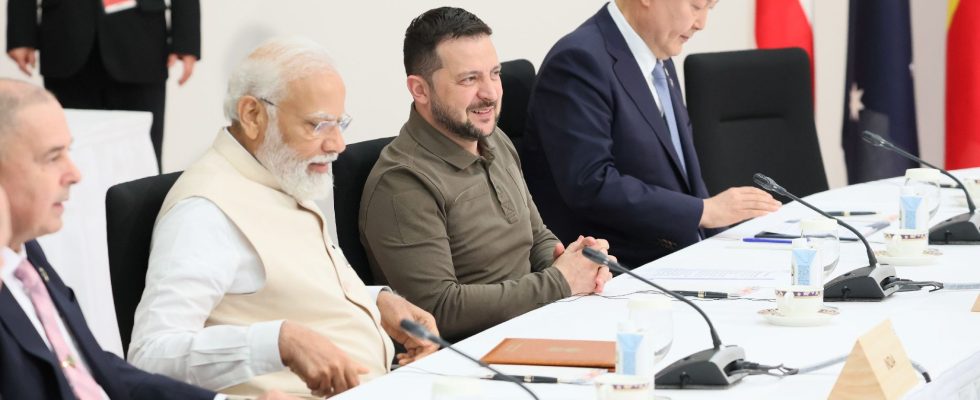Room with beige walls against a backdrop of paper cranes, a symbol of peace, and Ukrainian flags. Volodymyr Zelensky walks quickly towards the podium set up in the heart of the Hiroshima Peace Memorial Museum. Black sweater and fatigues pants, the surprise guest of the G7 summit spoke to the press this Sunday, May 21, at the end of a meeting concluded on the promise to “support Ukraine as long as necessary in the face of the Russia’s unlawful war of aggression”.
“The history of men should be written without war”, underlined the Ukrainian leader in his gravelly voice. Speaking without note, confident of his facts, the president denied that the city of Bakhmout had fallen and promised that “Russia will feel it when we launch our counter-offensive”. Volodymyr Zelensky knew how to play with his presence in the city razed to the ground in 1945. “The photos of destroyed Hiroshima reminded me of Bakhmout and other cities where there is nothing left. I have tears in my eyes” .
A mixed record
His visit, however, was not expected and was not a total success. “During his trip to kyiv in April, Prime Minister Fumio Kishida invited him to speak online. His arrival was decided and announced at the last minute,” said the Japanese host. Japan actually seems embarrassed, but refuses to say more about this format change. The Japanese media are more talkative: the decision would have been taken after a request sent by Volodymyr Zelensky on May 17 to France, which the latter does not deny. Didn’t the leader travel to Japan from Poland – with a stopover in Saudi Arabia for the Arab League summit – aboard the presidential Airbus stamped “French Republic”?
Hiroshima welcomed him well. Crowds lined the streets when he arrived. Several rallies were organized in support of Ukraine. Only a few reservations were expressed. “His visit is not appropriate for Hiroshima, which is a peaceful city”, reacted Etsuko Nakatani, an activist whose parents survived the atomic bombing of 1945. Yuta Takahashi, an activist born in Hiroshima, believes that the visit of Volodymyr Zelensky threatens to send a message “that justifies the need for nuclear deterrence in order to to prevent Ukraine from becoming another Hiroshima.”
Faced with a fait accompli
On the diplomatic level, Tokyo would have been presented with a fait accompli. Not in the best taste in a country resistant to surprises. The archipelago had struggled to bring in leaders from the “global South” who had not condemned Russian aggression and who did not necessarily want to cross paths with the Ukrainian leader. The Brazilian side did not appreciate the sudden arrival of Volodymyr Zelensky: the entourage of President Luiz Inácio Lula da Silva even spoke of a “trap”.
As a result, the Ukrainian president was unable to meet with Lula, nor with the Vietnamese and Indonesian leaders. The only representative of the “Global South” to have responded to his invitation, the Indian Prime Minister, Narendra Modi, who promised him that India would do “everything possible” to resolve the conflict and that he understood his “suffering” and that of the Ukrainian people. Insufficient for the Ukrainian leader, anxious “to involve as many countries as possible to put pressure on Russia”.
Advances ultimately came from his talks with G7 members and the Australian leader. US President Joe Biden announced $375 million in new military aid to Ukraine, saying the United States would provide ammunition and armored vehicles. He had previously authorized the training of Ukrainian pilots on F-16 fighters. Even before Zelensky’s arrival, the G7 countries had announced new sanctions against Moscow.
In a heartfelt response to bad luck, Japanese Prime Minister Fumio Kishida said the group was committed to “strongly supporting Ukraine at all levels”. The arrival of Volodymyr Zelensky also gave his G7 unexpected visibility, from which he fully benefits.
